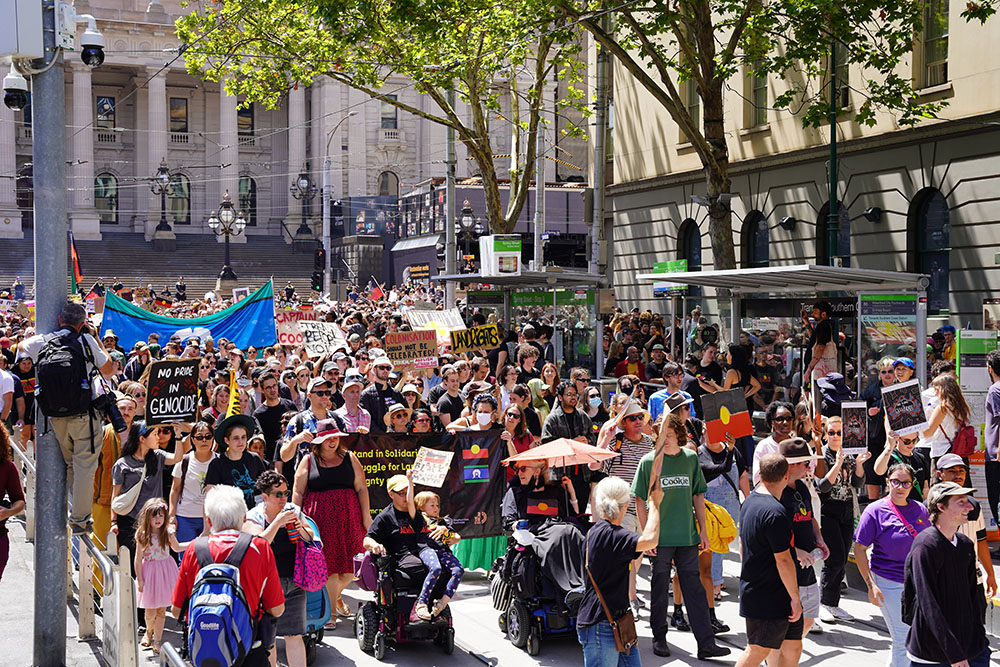CW: This blog article has discussions of systemic racism and genocide. There is an image that depicts Aboriginal and Torres Strait Islander people who died in police custody.
For many young people, 26 January is not a day to celebrate, but a day of mourning for the severe hardships endured by Aboriginal and Torres Strait Islander peoples since The process where one country takes control of another.colonisation began.
The day marks the arrival of the First Fleet on 26 January 1788, when British colonist Arthur Phillip landed in Warrane, later named Sydney Cove, and planted the Union Jack flag. This began the violent takeover of unceded land.

A History of Injustice
Governments in Australia have a long history of committing injustices towards Aboriginal and Torres Strait Islander people.
In the years after settlement, violent conflicts, The deliberate killing of a large number of people.genocide, diseases introduced by European settlers, and The systematic separation of people based on race or ethnicity.segregation, killed many Aboriginal and Torres Strait Islander people. Some estimates show the population was reduced by up to 90 per cent between 1788 and 1900.
Under a policy of A process where a minority group's language, traditions, and culture comes to resemble the dominant culture.assimilationin the twentieth century, governments took Aboriginal children away from their families against their will. Some children were placed with white families, while others were kept in institutions where abuse was common. The goal was to integrate them into Western ways of living, based on a racist belief that Aboriginal cultures, languages and traditions should be phased out.
Today, Australia remains without a treaty with its First Nations peoples. Aboriginal and Torres Strait Islander peoples often have their connection to land and culture overlooked by legal, social and political institutions.
Trauma experienced by one generation being passed on to the next.Intergenerational trauma, racism, and dispossession of land and culture have contributed to disproportionate health, housing, education and youth justice outcomes for Aboriginal and Torres Strait Islander young people.
One Australian Institute of Health and Welfare report in June 2021 found that on an average night in youth detention, 50 per cent of all young people in detention were Aboriginal or Torres Strait Islander. As the Raise the Age campaign states, every day in prison causes lifelong harm to a child, increasing their chances of developing mental illness and disengaging them from school.
While the gap is closing, there is still a fair way to go.

Change the Date or Abolish the Date?
Since 1994, 26 January has been a national public holiday. However, more people are recognising the date as one that is inappropriate to celebrate, with ‘Invasion Day’ rallies happening in every major city.
Aboriginal and Torres Strait Islander peoples have repeatedly expressed that this date is painful for their communities.
“Celebrating January 26th, consciously or unconsciously, glorifies white colonial histories and perspectives,” says Bundjalung and Worimi writer Phoebe McIlwraith.
“It glorifies it by constructing it as the A particular position where something occurs.locusof The traditions, cultures, and languages that give a nation its sense of self.national identityand positioning it as a point of celebration.”
Young people are the largest age group against celebrating the day, with one Roy Morgan poll finding that 64% of Australians aged under 25 were in favour of renaming 26 January ‘Invasion Day’.
There are a range of opinions about whether the date should be celebrated, changed, or abolished altogether.
Those who want to see the public holiday abolished argue that changing the date to a different day will do little to remedy the effects of colonisation.
“Pledges to #ChangeTheDate inspire a New-Year’s-resolution-esque commitment to transformation. These’ll never work,” says IndigenousX author and Gomeroi man Scott Trindall.
The state and federal government have recognised the diversity of views towards 26 January, but little action has been taken to reform the date. It is still a public holiday nationwide, celebrated with an official slogan, ‘Reflect, Respect, Celebrate’.
Some local governments across Melbourne, including Yarra, Darebin, and Merri-bek have recognised the date as a day of mourning and stopped holding citizenship ceremonies on 26 January. While there was significant backlash in the beginning, Councils are now able to hold citizenship ceremonies on the 26 January, or in the 3 days before or after.

Becoming a Better Ally
We must continue listening to, learning from and advocating for Aboriginal and Torres Strait Islander communities.
We can show our support by continuing to amplify Aboriginal and Torres Strait Islander voices, donating to relevant organisations, and showing up at rallies.
Allyship happens all year round, not just on one day per year.
“Non-Indigenous people across this continent today are not directly responsible for what happened in the past,” says Gunai/Kurnai, Gunditjmara, Wiradjuri and Yorta Yorta man Paul Gorrie.
“But it is part of our shared history as Indigenous people and non-Indigenous people and, together, we are responsible for what happens in the future.”
YACVic stands in solidarity with Aboriginal and Torres Strait Islander communities on 26 January, and encourages non-Indigenous Australians to learn about becoming a better ally.




